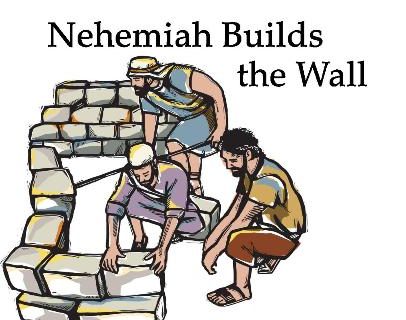In the Book of Nehemiah we read that Nehemiah (King Artaxerxe’s cupbearer) was granted permission by the king to return to Jerusalem to rebuild the wall. The wall was rebuilt around Jerusalem in fifty two days [Nehemiah 6:15]. We then read in Nehemiah 8 that all the people were gathered together in one place – such that the Book of the law of Moses would be read aloud, understanding of the law would be given, and proper worship (according to the law) would be reestablished. In Nehemiah 8:5-8 we read,
“And Ezra opened the book in the sight of all the people; (for he was above all the people;) and when he opened it, all the people stood up: And Ezra blessed the LORD, the great God. And all the people answered, Amen, Amen, with lifting up their hands: and they bowed their heads, and worshipped the LORD with their faces to the ground. Also Jeshua, and Bani, and Sherebiah, Jamin, Akkub, Shabbethai, Hodijah, Maaseiah, Kelita, Azariah, Jozabad, Hanan, Pelaiah, and the Levites, caused the people to understand the law: and the people stood in their place. So they read in the book in the law of God distinctly, and gave the sense, and caused them to understand the reading.”
As you continue to read through the remainder of the Book of Nehemiah, we find that when the people “heard” the Word of God and were given understanding to it; they “responded” with mourning, weeping, confession of their sins and for the sins of their fathers – because they understood their sinful condition and that they had forsaken their worship of the only True and Living God. Likewise, they came to understand God’s mercy and grace, for the Levites stated, “but thou art a God ready to pardon, gracious and merciful, slow to anger, and of great kindness, and forsookest them not.” [Nehemiah 9:17b]. And they stated, “Nevertheless for thy great mercies’ sake thou didst not utterly consume them, nor forsake them; for thou art a gracious and merciful God. Now therefore, our God, the great, the mighty, and the terrible God, who keepest covenant and mercy, let not all the trouble seem little before thee, that hath come upon us, on our kings, on our princes, and on our priests, and on our prophets, and on our fathers, and on all thy people, since the time of the kings of Assyria unto this day. Howbeit thou art just in all that is brought upon us; for thou hast done right, but we have done wickedly:” [Nehemiah 9:31-33].
Throughout the remaining chapters we find that proper worship was reestablished, separation of the mixed multitude (according to the law) took place, the house of God was cleansed, the violations of the sabbath were identified and ceased, and marriages with idolatrous people was stopped.
Though they had rebuilt the wall around Jerusalem in fifty two days, it only took the proper [response] to God’s Word to “rebuild the wall in their hearts”. For Ezra told the people, “This day is holy unto the LORD your God; mourn not, nor weep. For all the people wept, when they heard the words of the law. Then he said unto them, Go your way, eat the fat, and drink the sweet, and send portions unto them for whom nothing is prepared: for this day is holy unto our Lord: neither be ye sorry; for the joy of the LORD is your strength.” [Nehemiah 8:9-10].
The question must now be asked, “Is the wall around your heart in disrepair?” If so, why not seek to “hear” God’s Word and “respond” accordingly – for then you too will find that “the joy of the Lord is your strength”. Let us be reminded that “rebuilding the wall in your heart” will begin when you apply the words of Joel 2:12-13,
“Therefore also now, saith the LORD, turn ye even to me with all your heart, and with fasting, and with weeping, and with mourning: And rend your heart, and not your garments, and turn unto the LORD your God: for he is gracious and merciful, slow to anger, and of great kindness, and repenteth him of the evil.”
And to this we say, “Amen!”



